人教版高中英语必修三 Unit3 Using Language 教案优选公开教案
高一英语人教版必修3教案:Unit3UsingLanguage:Readingactingandspeaking+Word版含解析
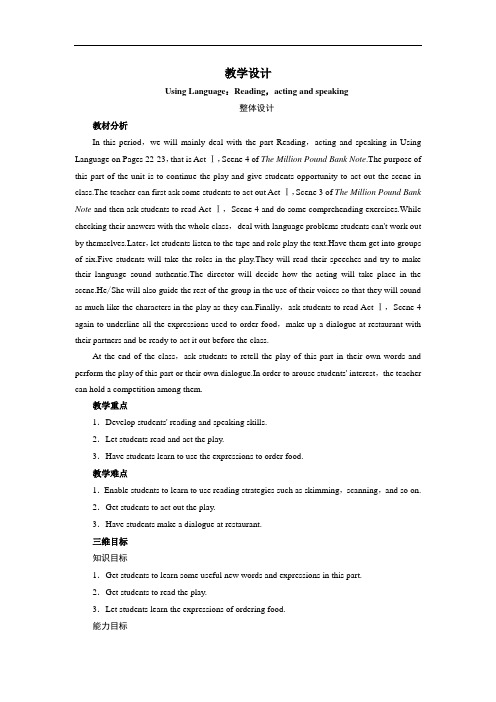
教学设计Using Language:Reading,acting and speaking整体设计教材分析In this period,we will mainly deal with the part Reading,acting and speaking in Using Language on Pages 22-23,that is Act Ⅰ,Scene 4 of The Million Pound Bank Note.The purpose of this part of the unit is to continue the play and give students opportunity to act out the scene in class.The teacher can first ask some students to act out Act Ⅰ,Scene 3 of The Million Pound Bank Note and then ask students to read Act Ⅰ,Scene 4 and do some comprehending exercises.While checking their answers with the whole class,deal with language problems students can't work out by ter,let students listen to the tape and role play the text.Have them get into groups of six.Five students will take the roles in the play.They will read their speeches and try to make their language sound authentic.The director will decide how the acting will take place in the scene.He/She will also guide the rest of the group in the use of their voices so that they will sound as much like the characters in the play as they can.Finally,ask students to read Act Ⅰ,Scene 4 again to underline all the expressions used to order food,make up a dialogue at restaurant with their partners and be ready to act it out before the class.At the end of the class,ask students to retell the play of this part in their own words and perform the play of this part or their own dialogue.In order to arouse students' interest,the teacher can hold a competition among them.教学重点1.Develop students' reading and speaking skills.2.Let students read and act the play.3.Have students learn to use the expressions to order food.教学难点1.Enable students to learn to use reading strategies such as skimming,scanning,and so on.2.Get students to act out the play.3.Have students make a dialogue at restaurant.三维目标知识目标1.Get students to learn some useful new words and expressions in this part.2.Get students to read the play.3.Let students learn the expressions of ordering food.能力目标1.Develop students' reading skills and enable them to learn how to use different reading strategies to read different reading materials.2.Enable students to understand and act out the play.3.Have students learn how to use the expressions to order food.情感目标1.Stimulate students' interests of learning English by reading and acting out this play.2.Develop students' sense of group cooperation and teamwork.教学过程Step 1 Revision1.Check the homework exercises.2.Translate the following sentences with noun clauses as the object and the predicative.1)我认为妇女能够在许多科学领域取得很高的成就。
2024年[课件]高中英语必修三unit3usinglanguage
![2024年[课件]高中英语必修三unit3usinglanguage](https://img.taocdn.com/s3/m/806d3b7d4a35eefdc8d376eeaeaad1f347931144.png)
2024年[课件]高中英语必修三unit3usinglanguage一、教学内容二、教学目标1. 让学生掌握关于志愿活动的相关词汇和表达方式,并能运用到实际语境中。
2. 培养学生的阅读理解能力,使其能够理解文章的主旨和细节。
3. 提高学生的写作能力,使其能够就志愿者经历进行描述和表达。
三、教学难点与重点1. 教学难点:词汇的运用和阅读理解文章中的长难句分析。
2. 教学重点:志愿活动相关词汇、阅读理解技巧以及写作表达。
四、教具与学具准备1. 教师准备:PPT课件、阅读文章、写作范文。
2. 学生准备:笔记本、教材、词典。
五、教学过程1. 实践情景引入(5分钟)教师通过展示一组关于志愿活动的图片,引发学生对志愿者工作的思考和兴趣。
2. 阅读理解(10分钟)学生阅读文章,完成相应的阅读理解练习。
教师针对学生的答案进行讲解,分析文章中的长难句,提炼关键信息。
3. 例题讲解(10分钟)教师选取一篇范文,分析文章结构、写作技巧以及亮点表达。
4. 随堂练习(10分钟)教师巡回指导,解答学生写作过程中遇到的问题。
5. 小组讨论(5分钟)学生分成小组,分享自己的写作成果,互相评价、提出建议。
六、板书设计1. 黑板左侧:列出文章中的重点词汇和表达。
2. 黑板右侧:展示文章结构、写作模板和要点。
七、作业设计1. 作业题目:请以“我的志愿者经历”为题,写一篇不少于100词的英语短文。
八、课后反思及拓展延伸1. 教师反思:本节课的教学效果,学生的参与度以及阅读和写作能力的提高。
2. 拓展延伸:鼓励学生在课后参与志愿者活动,将所学知识运用到实际中,提高自己的英语实践能力。
重点和难点解析1. 教学难点:词汇的运用和阅读理解文章中的长难句分析。
2. 教学重点:志愿活动相关词汇、阅读理解技巧以及写作表达。
3. 实践情景引入:引发学生对志愿者工作的兴趣。
4. 例题讲解:分析文章结构、写作技巧以及亮点表达。
5. 小组讨论:互相评价、提出建议,提高学生的写作能力。
人教课标版高中英语必修3Unit3_Using_language_公开课课件

Task 2
Find out their different attitude to Henry before and after showing the million pound bank note:
Before Henry shows his million pound bank-note
…if you pay the bill…
What’s there to wait for?
After Henry shows his million pound bank-note
Owner
Hostess
Waiter
I’m so sorry, sir, so sorry.
Oh, please, don’t worry, sir. Doesn’t matter at all.
1.Look for the phrases and key sentence structures in this passage.
2.Write a short passage about your own views about money.
Money can buy books, but not knowledge
Money can buy a position, but not respect
Money can buy medicine, but not health
Money can buy blood, but not life
The Million Pound Bank Note
--- Using language
Reading, acting and speaking
Unit3UsingLanguage教案高中英语人教版选择性

2019新人教高中英语选择性必修一Unit3 Using language--Visit a city park教案Teaching aims:1.Enable students to listen to the tape and figure out which activities Jake,Linlin and Yuhui are going to do2.Draw the route that they will take on the book and introduce it to your partners3.Take turns giving directions to different places in the parkTeaching key points:1.Understand the content and structure of a conversation about the route that they will take.2. 2. Identify the useful sentence patterns and expressions from the listening text.Teaching difficult points:1.Master how to take notes and use this technique to catch the key information in the listening process.2.Take turns giving directions to different places in the park.Teaching procedures:Step I Lead-inLook at the photos taken in Beijing Olympic Forest Park. Match them with the activities below. Write the correct letter in each circle.a cycle________through an underwater corridor _________a pedal boat________a fountain performance________on a children’s ride________at flowers________Suggested answers:B F A C E DStep ⅡListeningActivity 1 Pre-readingLook at the map with students to get them to be familiar with the places.(p30) Activity 2 Listening for the main idea.Listen to the conversation to summarize the main idea of it.Suggested answer: Jake, Linlin and Yuhui designed their best visit route according to the map.Activity 3 Listen for details(1)Draw the route that Jake, Linlin and Yuhui will take.(2)Mark the places they will visit on the map below. Pay attention to the sequence words and direction words.Step ⅢSpeakingWork in -play visiting the park. Take turns giving directions to different places in the park. Use the words and phrases below to help you.Asking for and giving directionsExcuse/Pardon me.Do you happen to know where... is?How do I get to ...How far is ...?Is... nearby?Is... close to ...?Is... far from ...?It's on the north/south/east/west side of the park.It’s about ... metres north of ...Walk/Go along the river/path ...Go through ...When you see the ...,you are close to ...Follow the(main)path to ...Go straight ahead(until you come to...).It’s ... metres from here.Suggest answer:A:Excuse me.B:Yes,how can I help you?A:I hear that this park has a very nice flower meadow. Could you tell me how to find it?B:Oh,you mean Flower Land? It's in the northwest corner of the north park.A:It sounds pretty far from here.B:Yes,it is.It's about two and a half kilometres from here on foot but it's a lovely walk if you have the time.A:But it's getting hope to see it while the sun is still shining.B: True,here's what you can do. You can take the underground. The Forest Park South Gate underground station is right over there. Go north one stop to the Lincuiqiao underground station. Walk north about eight hundred metres, and you'll see the park entrance on your right. Enter the park and walk about another four hundred metres. You will see a path leading to Flower Land on your right.It's just a short distance away from there.A:Is it really worth it?B:Oh,yes,the sunflowers are still in full bloom right now.A:Thank you so much.B:You're welcome.Step ⅣGroup WorkCreate your ideal theme park. these questions in groups.(1)What kind of theme parks do you want to create (2)What will your park offer visitors? Come up with at least three things for each category below and give them interesting names.Rides and attractions shows and events Restaurants and food stands2.Assign group members to prepare the following:(1)a short introduction to the park.(2)A large and colourful map of the park showing where everything is located(3)small pictures of the scenes discussed.the introduction,map and pictures together to make a poster. Present your poster to the class and give an introduction to your theme park.。
高中英语人教版选择性必修第三册UNIT3USINGLANGUAGE课件(27张PPT)可修改文字

Activation 1 Look at the pictures. What can you see? How do you describe them?
beautiful amazing awesome spectacular massive breathtaking ......
Unit 3 Using language
Activity 3: Read the text again and identify the structure
A. Introducing the topic B. Describing the problem (causes) C. Presenting the measures (solutions) D. Presenting further solutions and result
4.造成了严重的水质问题
5.破坏自然环境
6.改善水质
7.制定严格规定
8.宣传环保意识
9.鼓励更多地使用清洁能源
10.实施定期检查
11.对旅游机构的违规行为进行处罚
12.必须采取紧急措施以恢复漓江昔日之美。
13.有了这些举措,相信漓江之美将会得到保护并世代相传。
14.随着这些运动的开展,中国的水路正在走向洁净,可持续的
采取措施 做某事 必须采取紧急措施以改善水质。
_U_r_g_e_n_t _st_e_p_s_s_h_o_u_l_d_b_e__ta_k_e_n__to__im__p_r_o_v_e_t_h_e water quality .
2. With these measures, it is believed that the beauty of the Li River will be preserved for generations to come. 有了这些举措,相信漓江之美将会得到保护并世代相传。
Unit3FascinatingParksUsingLanguage教学设计-高中英语人教版选择性

Lesson Plan for PEP B4U3UsingLanguage
Visit aCityPark (1课时)
本课围绕城市公园展开,通过听一段发生在城市公园的对话,结合地图,明确人物所处位置以及游玩路线。该部分为本单元“公园”主题添加城市公园这一类别,同时也旨在激发学生思考城市公园对人们生活的意义。
【设计意图】执教老师引导学生通过欣赏了解城市公园,归纳不同城市公园的功能,深入思考城市公园的共性,使学生能够从人与社会的角度了解城市公园的主题意义和人文内涵。
Assignment
i.Practice your conversation in pairs. Use language expressions of asking and giving directions.
Q1: Listen again and draw the route that Jake, Linlin, and Yuhui will take.
Q2: Listen and fill in the blanks. Pay attention to sequence words and direction words.
Step 3.Probe into the significance of city parks.
Q1: Whatarethe functions of Beijing Olympic Forest Park and Taiziwan Park?
Q2:Whatfeaturesdothey have in mon?
T:Whatparks do you know in Hangzhou?
(展示太子湾公园和西溪湿地公园的图片)
Write downCity parkson the blackboard.
2019新人教高中英语选择性必修三Unit3Using Language(P30-P31)公开课教案

2019新人教高中英语选择性必修三Unit 3 Environmental ProtectionUsing Language(P30-P31)公开课教案Teaching aims:1.Enable students to obtain key information on different environmental issues such as climate change and air pollution from the listening material.2.Guide students to identify expressions used to introduce environmental issues.3.Help students to express your ideas on the causes of environmental problems by using expressions of giving opinions and reasons.e the information in this unit to contribute to your awareness and understanding of important environmental issues that affect the world and your futures.Teaching key points:1.Help students to obtain key information on different environmental issues such as climate change and air pollution from the listening material.2.Help students to use the expressions in the listening text to express air pollution and solutions.Teaching difficult points:1.Enable students to catch the key information of the listening material.2.Enable students to express their ideas on the causes and solutions of air pollution and learn from them with the help of the target vocabulary and expressions.Teaching procedures:Step ⅠLead-inLook at the pictures and discuss the questions in groups1.What information can you get from these pictures?2.How do these situations influence your life?Suggested answers:1.There’s smog in the air.The coal is burning and the sky is not clean.The air is polluted.2.They are harmful to our environment and health,and also have a bad influence on our living.For example,people have to take face masks when they go outdoors.StepⅠPre-listeningActivity 1Discuss in your groups and answer the questions1.What did you know about “smog”?2.Is “smog” a main source of pollution?Suggested answers:1.Smog is a kind of dirty air that looks like a mixture of smoke and fog,caused by smoke from cars and factories in cities.2.Yes,smog makes air dirty.Activity 2Guess the content of the listening material (interview)Suggested answers:They will probably be talking about air pollution.For example,the definition of “smog”,the serious situation of “smog”,and government’s measures to deal with “smog”.Activity 3Watch a short video and answer the following questions1.What can you learn from the video?2.Work in a group,and discuss the causes of air pollution.3.What can we do to solve air pollution?Suggested answers:1.From this video,I know what is air pollution,and the causes and damages of airpollution as well as what we should do to protect our air and environment.2.Some air pollution comes from natural sources,like volcanic eruptions,but most air pollution results from human activities,such as energy use and agriculture.3.We can limit toxic substances,decrease the use of fossil fuels,use public transportation and so on.StepⅠWhile-listeningActivity 1Listen to an interview with an air pollution expert and decide whether the statements are True(T) or False(F)1.The expression “smog” originated in Britain and means a combination of “smoke” and “fog”.2.Smog became a severe problem in Britain because people at that time burnt lots of fossil fuels.3.The worst smog in British history happened in London in 1942.4.The Great Smog of London claimed 5,000 lives.ter,the UK government ordered people not to burn wood in their homes.Suggested answers:1.T2.T3.F(1952)4.F(4,000)5.F(coal)Activity 2Listen again and take notes on what the expert said.Then summarise the information you got from the interviewBen Drake,an expert on air pollution,is being interviewed on the radio.He said that smog was a severe problem century in Britain.At that time,Britain was experiencing a boom in .Factories and homes ,which created smog.He also mentioned the heavy smog in London in ter the UK government restricted in homes and forced factories to .As smog is harmful to everyone,the expert advised us to ,use,and further develop .Suggested answers:in the early 20th;industry;used lots of coal;was particularly bad and caused over 4,000 deaths;burning coal;move away from city centers;replace coal with cleanerforms of energy;new energy-efficient vehicles;green technologyActivity 3Work in groups and discuss the questions.The expressions in the box may help you1.Have you experienced heavy smog where you live?Have you seen photos of big cities under clouds of smog?What is it like?2.What do you think are the major causes of smog in China?3.What measures have the government and citizens taken to help address the problem?Referring to common knowledge·Everyone knows that...·There is no doubt that...·Most people think that...·We all know that...·As is known to all,...·It is obvious that...Related WordsPM2.5(particle matter 2.5)smog alert(雾霾警报)smoggy day anti-smog maskair-quality index(空气污染指数)heavy/thick/dense smogclean energy public transportrestrict the consumption of fossil fuelenforce new emission standardsSuggested answers:The answers vary.StepⅠPost-listeningActivity 1Read the listening material carefullyH=Hostess BD=Ben DrakeH:Good morning,listeners.Air pollution is a serious problem,with urban populations particularly at risk from smog.Ben Drake is an expert on air pollution,and he is joining us today to talk about this issue.Ben,where does the word “smog” come from?BD:“Smog” comes from a combination of the words “smoke” and “fog”.It originated in Britain in the early 20th century,when smog was a severe problem.H:Why was it so bad then?BD:Well,Britain was one of the first industrial countries and factories and homes used lots of coal.When burnt,the coal produced harmful emissions which created lots of smog.In London,they also called the smog a “pea soup” because it was as thick as soup.H:That sounds terrible! What problems did it cause?BD:Smog caused many health issues and killed many people.The worst case happened in London in 1952.Over a few days when the smog was particularly bad,4,000 deaths were recorded.It was necessary to take immediate action.The UK government ordered people not to burn coal in their homes and forced factories to move away from city centres.H:But smog is still an important issue in many places.What can be done about it?BD:Smog is harmful to everyone,especially to children,old people and those with heart or lung problems.We have to reduce smog and improve air quality for everyone’s health and well-being.We should replace coal with cleaner forms of energy,and we need to use new energy-efficient vehicles.We have the technology,but we must use and develop it.H:Yes.Let’s hope we can make some big changes.Thanks,Ben.BD:Thank you.Activity 2Appreciate a song and answer the questionHow do you feel after listening to this song?Suggested answers:We should try our best to reduce pollution and protect the environment.To protect the blue sky is to protect human beings.In this case,we ought to be in close contact with nature.Activity 3Make up a dialogue about environment pollution with your partner,using the common knowledge expression.。
2019新人教高中英语选择性必修三Unit3Using Language(P32-P33)公开课教案

2019新人教高中英语选择性必修三Unit 3Environmental protectionUsing Language(P32-P33)公开课教案Teaching aims:1.Enable students to understand and master the impact of li River pollution on the environment and the treatment process;2.Guide students to clarify the structure and language features of the article;3.Help students to analyse the causes and solutions of environmental pollution;plete the report of environmental pollution problems through teamwork and division of labor.Teaching key and difficult points:1.Lead the students to read the text about the pollution of Li River and write a report about environmental pollution.2.Lead the students to write a report about environmental pollution.Teaching procedures:StepⅠPre-readingLook at the pictures and answer the questionWhat do you think might have caused water pollution in the Li River?Suggested answers:An increasing volume of tourists, many tour boats, kitchens on board, the increase of local population,etc.Step ⅠWhile-readingRead the text and answer the question1.What’s the main idea of the text?The text mainly talks about Li River’s and .2.Read the text and decide whether the following sentences are true (T) or false(F)(1)It attracts millions of domestic and foreign visitors each year.(2)Kitchens on board were using lots of food,which was often thrown into thewater.(3)The collection and transport of industrial waste was also improved.(4)The local government set up strict regulations regarding further industrial development.(5)With such campaigns in effect.China’s waterways are heading towards a clean and sustainable future.3.Read the report and then answer the questions(1)What were some of the negative effects on the Li River as a result of the growth in tourism?(2)What measures have been taken to improve the Li River’s water quality?(3)What is the“River Chief System”?Suggested answers:1.problems; measures taken to protect the river2.(1)—(5)TFFTT3.(1)Negative effects from the growth of tourism on the Li River include garbage being thrown by tourists and kitchens on tour boats dumping cooking oil into the river. Because of the success of tourism, the population and number of enterprises also rose, meaning there was more waste going into the river.(2)①Wastewater treatment and household waste collection and transport facilities have been improved.②Dozens of polluting businesses were moved or closed.③New rules about waste disposal and fines for abusers were introduced.④Authorities used the media to spread awareness of the issue.(3)The “River Chief System” holds senior officials responsible for reducing water pollution.StepⅠAnalysing1.Read the text and complete the paragraph summaryPara.1Introducing the topic.Para.2Describing the .Para.3Presenting some .Para.4Presenting further .2.Draw a mind map to show all the factors that caused the pollution3.Draw a mind map to show the measures that deal with the pollutionSuggested answers:1.water pollution;measures;measures2.3.StepⅠWritingUse what you have learnt to write a report on an environmental issueBefore writing,figure out the questions below.1.Choose an environmental problem that directly affects you or your local community.Research the issue on the Internet.Consider the following questions: What is the issue?Why does it need to be dealt with?Where does the issue occur?What are its causes?What effects does it have?What actions have been taken so far?What future actions are planned?Has the issue been dealt with well?Is it likely to be solved completely?Why or why not?What alternative solutions are possible?Learn the useful expressionsCause and effect have negative effects on,suffer from,contribute to,inorder to,lead to,cause...Problem and solution※Urgent steps should be taken to...※A comprehensive initiative...※With a number of measures that addressed...※With these measures...※With such campaigns in effect...※Verbs:improve,close,set up,introduce,spread,carry out,fine,preserve,tackle,head towards...2.Write your report.Exchange drafts with a e this checklist to give feedback on the partner’s draft.Does the writer describe the environmental issue clearly?Do the measures taken to deal with it sound effective?Does the writer use correct grammar,punctuation,and spelling?Get your draft back and revise it.Then present your report to the class.Suggested answers:2.Litter is a big issue in our local community. We must deal with it because it is bad for local wildlife and it makes our community look terrible.This mostly occurs in our local park. It is caused by people dropping food wrappers from the nearby fast food restaurant.So far, we make sure the park is cleaned every day. We have added more rubbish bins in the park to make it easier for people to dispose of this waste. We also spoke to the fast food restaurant and asked them to encourage people to dispose of their waste properly.There is a plan to add more bins and signs to inform people about the need to dispose of waste properly. We have also asked the restaurant to provide help in cleaning up their waste.The issue has been dealt with well, but more work is needed. It is hard to deal with these issues because there is a never-ending source of waste as people willalways need to buy food. In the future, the best solution would be to find alternative ways of packaging.StepⅠHomework目前,环境保护已成为人们极为关心的问题。
【课件】Unit+3Using+language+课件人教版(2019)选择性必修第三册
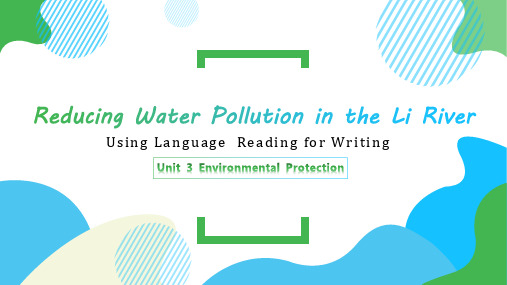
Para 3 solutions/measures Para 4 further solution/plan
仿写
因私家车尾气排放增多,北京空气污染问题严重。(suffer from, an increasing volume) Air quality in Beijing suffered greatly from an increasing volume of private cars which released excessive car exhaust into the air.
Causes of Li River Pollution
Tourists throwing rubbish in water
Tour boats throwing cooking oil in water
Rise in number of commercial and industrial enterprises = more waste
Fast-reading
skimming
Prediction ·Style: Report
·The main idea of the text:
Water pollution in the Li River; measures to reduce the pollution
Task 1: Read the text and find the main idea of each paragraph.
2.3 Complete the sentence.
人教版高中英语必修三 Unit 3 Using language教案
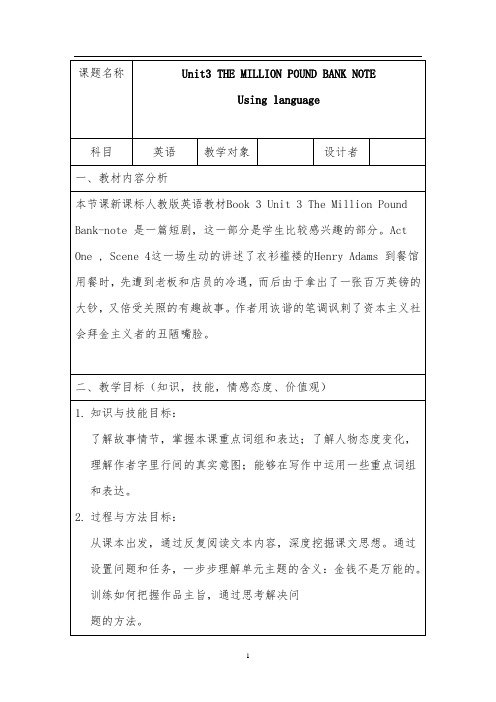
多媒体,黑板,视频,图片
六、教学过程
教学过程
教师活动
学生活动
设计目的
第一步:lead in
Show some pictures to the studentsandask two groups to play Act One, Scene3
Students come to the front of the classroom and play Act One, Scene3
According to the key words and retell the story
To output what the students havelearned in class.
七、教学评价
•Face all students, design different activities, try hard to arouse students’ interest.
Show the movie to the Ss and present two questions:(1)What did the hostess feel
When Henry came into the restaurant? How do you know?(2)Why were the owner and hostess shocked when she saw the million pound bank-note in Henry’s hand?
•Highline the students main body and respect individual difference.
•Attach as many opportunities as possible for the students to output after input.
教材高中英语UNITPOEMSSectionⅢUsingLanguage学案新人教版选择性必修第三册
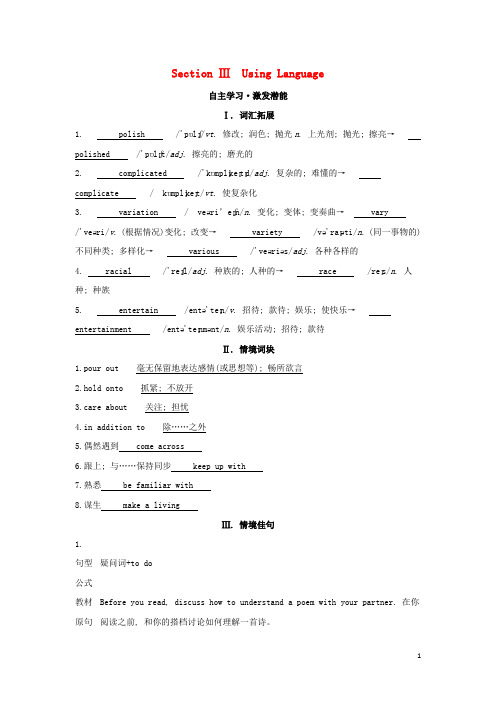
Section Ⅲ Using Language自主学习·激发潜能Ⅰ. 词汇拓展1. polish /'pɒlɪʃ/vt. 修改; 润色; 抛光n. 上光剂; 抛光; 擦亮→ polished /'pɒlɪʃt/adj. 擦亮的; 磨光的2. complicated /'kɒmplɪkeɪtɪd/adj. 复杂的; 难懂的→complicate /kɒmplɪkeɪt/vt. 使复杂化3. variation /veəri’eɪʃn/n. 变化; 变体; 变奏曲→ vary /'veəri/v. (根据情况)变化; 改变→ variety /və'raɪəti/n. (同一事物的)不同种类; 多样化→ various /'veəriəs/adj. 各种各样的4. racial /'reɪʃl/adj. 种族的; 人种的→ race /reɪs/n. 人种; 种族5. entertain /entə'teɪn/v. 招待; 款待; 娱乐; 使快乐→ entertainment /entə'teɪnmənt/n. 娱乐活动; 招待; 款待Ⅱ. 情境词块1.pour out 毫无保留地表达感情(或思想等); 畅所欲言2.hold onto 抓紧; 不放开3.care about 关注; 担忧4.in addition to 除……之外5.偶然遇到 come across6.跟上; 与……保持同步 keep up with7.熟悉 be familiar with8.谋生 make a livingⅢ. 情境佳句1.句型公式疑问词+to do教材原句Before you read, discuss how to understand a poem with your partner. 在你阅读之前, 和你的搭档讨论如何理解一首诗。
高中英语Unit3UsingLanguage学案新人教必修3

广东省惠州市惠东县惠东荣超中学高中英语 Unit 3 Using Language学案新人教版必修3Learning aimsMaster the important words and phrases of the text.Know the main idea of the text.Cultivate one's appreciation in drama.Important & difficult pointsLanguage points. 2. Act it out.课前预习案Previewing caseTask 1 Words consideration.steak n. ________ 2.pineapple n. __________ 3.dessert n.__________4. _______ 数量→(短语)__________ 大量的__________adj. 粗鲁的;无理的___________n. 无理;粗鲁6. __________ n.举止;方式_________n.礼貌7._________ v. 尖叫; n.尖叫声;喊叫声8.________ adj. 真的,真诚的9. _______ vi.&n. 鞠躬弯腰10. _________ n. 理发师11. reserve v._______ n.________Task 2 Phrases冒险_______________ 2.衣衫褴褛________________3. 关于;至于___________4.eat like a wolf _____________Task 3 Fast reading : True or false?(1) The owner looked down upon Henry when he noticed Henry’s appearance. ____(2) Henry asked for more of the same food because he is an American who like to eat a lot. ____(3)When Henry saw the million pound bank-note, he was happy and proud of it. ____(4)The owner did not believe that the bank-note was real and he asked Henry to get out of the restaurant. ____Task 4 Answer these questions.What did the hostess feel when Henry came into the restaurant? How do you know?________________________________________________________________________.2. Why were the owner and hostess shocked when they saw the million pound bank-notein Henry’s hand?________________________________________________________. Whose behavior changes the most during this scene? Give examples._________________________________________________________________________. What can we learn from this story?_________________________________________________________________________.Task 5 Retell the story by filling the blanks._______forced him to go into a restaura nt. The owner and the waiters served him in a _____ manner. However, when they saw the note, their ________to Henry changed greatly. It was very common to_______ a stranger by their clothes in the capitalist countries.探究案Exploring caseTask 1 What did the owner/ waiter/hostess say before Henry took the note out of the Envelope? How about after. Give some example.Before Henry took the note: ______________________________________________________ After Henry took the note: _______________________________________________________Task 2 Language points.1. He sits down at a table next to the front window. 他在靠近前窗子的桌子旁坐了下来。
高中英语 Unit3 using language教案 新人教版必修3

解
学生活动设计
学
环
节
Step 1:First Reading Read through the text quickly and then comp lete the True or False questions. 1. The owner looked down upon Henry when he noticed Henry’s appearance. T 2. Hen ry asked for more of the same food because he is an American who likes to eat a lot. F 3. When Henry saw the million pound bank-note, he was happy and proud of it. F 4. The owner didn’t believe that the bank-note was real and he asked Henry to get ou t of the restaurant. F Step 2:Careful Reading Read the passage and answer the following questions 1. What did the hostess feel when Henry came into the restaurant? How do you know? She felt very impatient and looked down upon Henry because of his poor appearance. “Why, look at him, he eats like a wolf.” 2. How about Henry’s feeling after he finished eating and asked another one? He felt satisfied and full. That was a wonderful meal. 3. Why were the owner and hostess shocked when they saw the million pound bank-note in Henry’ hand? Because they never thought that the bank-note belonge d to such a person in rags. 4. What made them trust that the ba nk-note was gen uine? Mr. Clemens’ words. He said “Two notes in this amount have been issued by the Bank of England this year. No thief would want that to happen.” 5. What can we learn from this story? We shouldn’t judge people by appearance. Money is everything in the capitalist society. Step 3: Retell the story by filling the following blanks __Hunger_ forced him to go into a restaurant. The owner and the waiters served him in a _rude _ manner. However, when they saw the note, their __attitude_ to Henry changed greatly. It was very common
人教版高中英语必修三Unit3UsingLanguage教案优选公开教案

人教版高中英语必修三Unit3UsingLanguage教案优选公开教案Unit3 Using Language精品教案Period 3 Using LanguageTeaching objectives:1. To continue the story and give Ss the opportunity to act out the play or act an interview.2. To improve Ss’ abilities of listening and writing.Teaching Procedures:Step 1. Reading and actingPurpose:To let Ss understand Mark Twin’s humors and try to act out the story.1.Pre-readingAsk Ss to try to get the meanings of the new words and let them read Act One loud to recall what happened before Scene 4.Suggested Answer:Henry Adams, an American businessman, had some very bad luck. He was lost in London. He had no money and did not know what he should do. When he was walking down the street, he was invited into a house. Two brothers asked him a lot of questions and promised to help him. They gave him a letter, which Henry couldn’t open it until two o’clock. In fact, they made a bet on him. Now, after leaving their house, Henry steps into a restaurant.2.Reading(1) Ask Ss to form several groups six, five of whom will take parts in the play. The sixth person will direct the acting. Let Ss read the play and pay attention to their language, making the language sound authentic.(2) Let Ss answer the following questions.①What does Henry get from the letter?②Is the bank-note a fake? Why?③What are the differences between the attitudes of the owner?④Why do you think the owner trust Henry at last?Suggested Answers:① He gets a million pond bank-note.② No. Because, two notes in this amount have been issued by the Bank of England this year.③ Wh en the owner sees Henry’s appearance, he looks down upon him. Then Henry takes out the bank-note to pay his meal. The owner is shocked by it. And he changes his attitude towards Henry.④ The owner is so sophisticated (世故的) that he just pretends to be3. ActingAfter reading the play, ask two or three groups to perform in front of the class. And let others choose the best group. Then suppose a journalist in London heard this unbelievable story: A millionaire in rags had a meal in a restaurant. He thought it might make an excellent article. So he rushed to that restaurant and interviewed the owner, the hostess and the waiter. Let the groups act out the interview.4. Language point(1) order① n 叫/要的菜May I take you order now? 您的菜点好了吗?② n 顺序,次序The books are arranged in order of size. 书籍按尺寸码放。
人教课标版高中英语必修3Unit3_Using_language_名师教学设计

Unit3 Using language 名师教学设计Teaching aims:In this class, I want to achieve the following aims by the end of the period: Knowledge aims:1. Students will know more knowledge and ways to appreciate English novels.2. Students will analyze each character by observing their language and body languag es.Ability aims:1. Students will be able to develop the reading skills such as predicting, skimming, sc anning, summarizing and inferring in the reading process.2. Students will promote their cross-cultural awareness and communication. Emotion aims:1. Students’ sense of group cooperation and teamwork will be developed.2. Students will know that they should set up correct viewpoint of value.II. Teaching proceduresStep1 Warming up1. BrainstormingShow apiece of video of interviewing others.Question: What do you like most? If you have a large amount of money, what will y ou do with it?2. ReviewWith a micro-class video to motivate students to retell the the play of Act1, Scene3. Step 2 ReadingI. Pre-reading1. PredictingQuestion: What may happen to Henry after he left the house?II. While-reading1. SkimmingAsk students to summarize the main idea of the whole story with the help of a blankfilling exercise.2. Scanning(1) Ask students to arrange the order of the story development.3. Inferring(1) Analyze main characters.A: Analyzing from languageDivide the whole class into 3 groups to pick out their words of the owner, the hostess and the waiter independently.Analyze the words of each character. B: Analyze from body languageGive students some different printscreens(截屏) about various facial expressions an d gestures of the owner and the hostess and put them in the time order. Encourage students to use adjectives to describe the feeling of each picture.4. Consolidating(1) Dub(配音) the clip.(2) Thinking: When did the owner, hostess and the waiter change their attitude? What kind of the person are they?Ⅲ. Post-reading1. Self-reflection. What can you get from the lesson?2. Show a poem about respect.3. An interview.If you were a reporter. When Henry ate in the restaurant, you happened to be there a nd saw what had happened. When he left, you followed him and ask what you wanted to know.(Possible aspects: Henry's own feeling after being rich;Henry's feeling about the change of the attitudes; ...... )Step 3 Homework1. The required part.Write a composition according to the play, and they can choose from every aspect.2. The optional part.Use their imagination to continue the story.Ⅳ.Blackboard DesignUnit 3 The Million Pound Bank NoteOwnerHostess Language Body language change (attitude)WaiterHenry: doubtful—>determined——>satisfied——>surprised——>confused——>th ankfulⅤ. ReflectionAs for this lesson, the reflection contains the following aspects:First, classroom atmosphere is relaxing. Students don’t feel nervous and most stu dents participate willingly and the teacher-student relationship is in harmony. Second, students’ reading, listening and speaking ability have improved through these activitie s.Third, using different activities and analyzing characters from different aspects have a great effect on their study.。
高中英语人教版必修三教案:Unit3+Using+language.doc
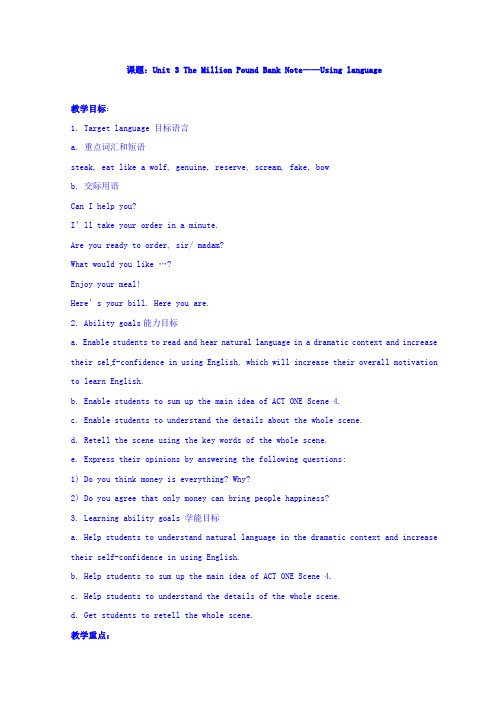
课题:Unit 3 The Million Pound Bank Note——Using language教学目标:1. Target language 目标语言a. 重点词汇和短语steak, eat like a wolf, genuine, reserve, scream, fake, bowb. 交际用语Can I help you?I’ll take your order in a minute.Are you ready to order, sir/ madam?What would you like …?Enjoy your meal!Here’s your bill. Here you are.2. Ability goals能力目标a. Enable students to read and hear natural language in a dramatic context and increase their sel f-confidence in using English, which will increase their overall motivation to learn English.b. Enable students to sum up the main idea of ACT ONE Scene 4.c. Enable students to understand the details about the whole scene.d. Retell the scene using the key words of the whole scene.e. Express their opinions by answering the following questions:1) Do you think money is everything? Why?2) Do you agree that only money can bring people happiness?3. Learning ability goals 学能目标a. Help students to understand natural language in the dramatic context and increase their self-confidence in using English.b. Help students to sum up the main idea of ACT ONE Scene 4.c. Help students to understand the details of the whole scene.d. Get students to retell the whole scene.教学重点:a. How to interpret language through tone of voice and body language, gaining a greater appreciation of the various verbal and non-verbal ways in which language works.b. Discuss the questions:1) Do you think money is everything?2) Do you agree that only money can bring people happiness?教学过程:Step I Introduce some new words:steak:eat like a wolf:genuine:reserve:scream:fake:bow:Step II CULTURAL NOTEHenry asks for a steak “extra thick” for his meal. In China, steak is generally cut thinly but in America it is appreciated if it is cut thickly and grilled or fried. The advantage of having a steak “extra thick” is that it can be well cooked on the outside but still raw or half raw in the center.Step III Read and answer these questions:1. What was it in the letter?2. Before Henry took the note out of the envelope, did the waiter serve him politely? Why?3. Did the owner believe that the note was genuine or not? Why?4. Whose behavior changes the most during this scene?5. What kind of person is the owner of the restaurant?6. Why do you think the owner of the restaurant gave Henry a free meal?Step IV Detailed reading1. What does “it’ll cost a large amount of money” exactly mean?2. At the sight of the customer’s note, the owner a nd his waiter got very _D_.A. frightenedB. angryC. worriedD. excited3. When did the hostess and the waiter change their attitude to the customer? _____D____A. At the beginning of the story.B. Before they saw the large note.C. At the end of the story.D. After they saw the large note.In group of four, play the parts of “Henry, waiter, owner and hostess”.审核人:精美句子1、善思则能“从无字句处读书”。
人教版高中英语必修3 Unit3 Using language 优秀教学设计
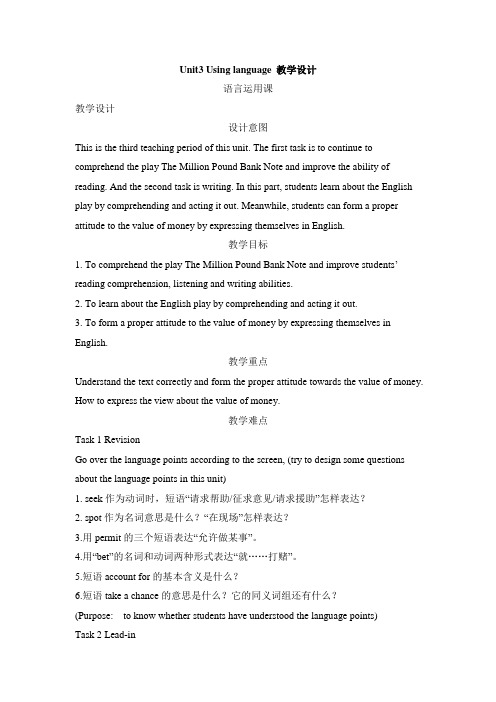
Unit3 Using language 教学设计语言运用课教学设计设计意图This is the third teaching period of this unit. The first task is to continue to comprehend the play The Million Pound Bank Note and improve the ability of reading. And the second task is writing. In this part, students learn about the English play by comprehending and acting it out. Meanwhile, students can form a proper attitude to the value of money by expressing themselves in English.教学目标1. To comprehend the play The Million Pound Bank Note and improve students’ reading comprehension, listening and writing abilities.2. To learn about the English play by comprehending and acting it out.3. To form a proper attitude to the value of money by expressing themselves in English.教学重点Understand the text correctly and form the proper attitude towards the value of money. How to express the view about the value of money.教学难点Task 1 RevisionGo over the language points according to the screen, (try to design some questions about the language points in this unit)1. seek作为动词时,短语“请求帮助/征求意见/请求援助”怎样表达?2. spot作为名词意思是什么?“在现场”怎样表达?3.用permit的三个短语表达“允许做某事”。
- 1、下载文档前请自行甄别文档内容的完整性,平台不提供额外的编辑、内容补充、找答案等附加服务。
- 2、"仅部分预览"的文档,不可在线预览部分如存在完整性等问题,可反馈申请退款(可完整预览的文档不适用该条件!)。
- 3、如文档侵犯您的权益,请联系客服反馈,我们会尽快为您处理(人工客服工作时间:9:00-18:30)。
Unit3 Using Language精品教案Period 3 Using LanguageTeaching objectives:1. To continue the story and give Ss the opportunity to act out the play or act an interview.2. To improve Ss’ abilities of listening and writing.Teaching Procedures:Step 1. Reading and actingPurpose:To let Ss understand Mark Twin’s humors and try to act out the story.1.Pre-readingAsk Ss to try to get the meanings of the new words and let them read Act One loud to recall what happened before Scene 4.Suggested Answer:Henry Adams, an American businessman, had some very bad luck. He was lost in London. He had no money and did not know what he should do. When he was walking down the street, he was invited into a house. Two brothers asked him a lot of questions and promised to help him. They gave him a letter, which Henry couldn’t open it until two o’clock. In fact, they made a bet on him. Now, after leaving their house, Henry steps into a restaurant.2.Reading(1) Ask Ss to form several groups six, five of whom will take parts in the play. The sixth person will direct the acting. Let Ss read the play and pay attention to their language, making the language sound authentic.(2) Let Ss answer the following questions.①What does Henry get from the letter?②Is the bank-note a fake? Why?③What are the differences between the attitudes of the owner?④Why do you think the owner trust Henry at last?Suggested Answers:① He gets a million pond bank-note.② No. Because, two notes in this amount have been issued by the Bank of England this year.③ Wh en the owner sees Henry’s appearance, he looks down upon him. Then Henry takes out the bank-note to pay his meal. The owner is shocked by it. And he changes his attitude towards Henry.④ The owner is so sophisticated (世故的) that he just pretends to be3. ActingAfter reading the play, ask two or three groups to perform in front of the class. And let others choose the best group. Then suppose a journalist in London heard this unbelievable story: A millionaire in rags had a meal in a restaurant. He thought it might make an excellent article. So he rushed to that restaurant and interviewed the owner, the hostess and the waiter. Let the groups act out the interview.4. Language point(1) order① n 叫/要的菜May I take you order now? 您的菜点好了吗?② n 顺序,次序The books are arranged in order of size. 书籍按尺寸码放。
③ n 命令Soldiers must obey orders. 军人必须服从命令。
We did it on his order. 我们奉他之命做了那件事。
④ v 命令The officer ordered his soldiers to march. 长官命令他的士兵前进。
⑤ v 预订,订购I have ordered a new computer from the shop. 我从商店里订购了一台新电脑。
I’ve ordered a steak. 我点了一份牛排。
(2). take a chance 碰运气As for whether he will win the game or not, we must take a chance. 对于他能否取胜,我们只能碰运气。
(3) manner n①方法;方式Why are you talking in such a strange manner? 你为什么用这种奇怪的方式谈话?②态度;举止He talked to her in a very rude manner. 他很粗鲁地和她说话。
③礼貌,礼节;风俗,习俗It's bad manners to talk with a mouth full. 嘴里有食物时说话不礼貌。
You should have good manners all the time. 你应该时时刻刻都讲礼貌。
These are the manners and customs of the Chinese. 这些是中国人的风俗习惯。
(4) genuine adj 真正的;真实的;名副其实的We cannot make sure it is a genuine painting. 我们不能确认它是一幅真画。
● 辨析:◆ genuine指物品的来历或性质同所说的是一致的。
如:a genuine antique 一件真古董。
genuine knowledge 真知;真正的知识◆ real adj 真实的;真正的;指从外表看来不是虚假或伪造的That is a real dog, not a toy. 那是一条真狗,而不是一个玩具。
◆ true adj 意为“真实的;确实的;确切的” 指符合实际情况。
It is true that he has won the prize. 他确实赢得了奖品。
Is it true that he is rich? 他很富有,是真的吗?(5) in rags穿着破旧衣服;穿得破破烂烂的(状态)The old man is in rags. 那个老人穿得破破烂烂的。
(6) indeed adv①的确是;实在是;当然— Did you hear the explosion last night? 你昨晚听见爆炸声了吗?— Indeed I did. 我确实听到了。
② (表示惊奇、反语等)真是的;的确—I earn $1000 a day. 我一天赚一千美元。
—— Indeed? 真的吗?(7)from the bottom of one’s heart衷心地,真诚地;发自内心地It was a request from the bottom of my heart. 这是我发自内心的请求。
● 拓展:break one’s heart 让某人伤心learn sth by heart 记住heart and soul 全心全意地lose heart 失去信心lose one’s heart to sb = fall in love with sb 爱上某人Step 2. Listening and writingPurpose:To improve Ss’ listening ability.To get Ss to know what happened to Henry after Scene 4.1.Ask Ss to look through the exercises of Ex1 before listening and then play thetape.2.Ask Ss to think of more things Henry might do with the bank-note. Let them try tomake up what might happen after Henry do these things.Step 3. ReadingPurpose: To get Ss to know something about the famous writer Mark Twain.To get Ss to learn how to introduce a famous person to the readers.1. Ask Ss if they know who is the man in the following pictures and tell as much information about him as possible. Under the pictures are some famous Mark Twain quotes for Ss to enjoy.◆ Always tell the truth; then you don't have to remember anything.◆ The man who does not read books has no advantage over the man that can not read them.◆ Good breeding consists in concealing how much we think of ourselves and how little we think of the other person.◆When people do not respect us we are sharply offended; yet deep down in his private heart no man much respects himself.◆Anyone who can only think of one way to spell a word obviously lacks imagination.2. Ask Ss to read the passage carefully and answer the following questions:(1) Which famous river played an important role in Twain’s writing?(2) Why did Mark Twain get this pen name?(3) What kind of jobs did Mark Twain ever do?(4) For what Mark Twain’s writing is so famous?(5) Is he still one of the most popular writers in the world today?Suggested Answers:(1) The Mississippi River.(2) Because he loved the river so much that even his pen name is about the river.(3) A painter, a riverboat pilot, a soldier, a gold miner, a businessman and a newspaper reporter.(4) His writing is famous for its description of common people and the way talked, but especially for his humors.(5) Yes. He is still one of the most popular writers in the world today.3. Ask Ss to fill in the table below under the passage on P23 and then check the answers in pairs.Step 4. Writing1.Ask Ss to imagine what Henry will do after he leaves the restaurant, as his hair isa little bit too long.2.Ask Ss to work in pairs and suppose they are the directors of the play and writetheir own scenes for the play. Remind them to use at least three stage directions in their scenes.3.If necessary, tell Ss what is the stage direction and after they finish, ask some pairsto read aloud their play. Then ask the whole class to decide which pair’s writing isthe best.Step 5. Homework1.Ask Ss to choose any topic to make a short play and act it out.2.Ask Ss to preview the next period.。
